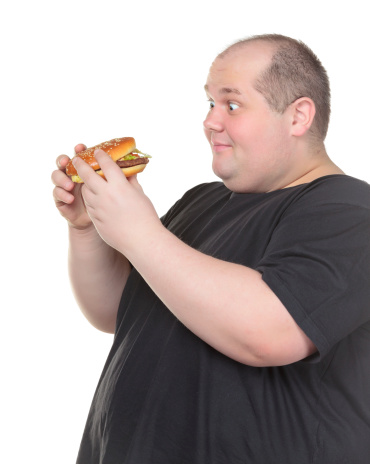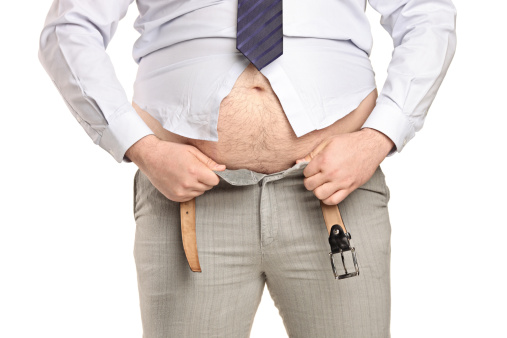Stay Informed
Popular Articles
- Hiatal Hernia: Hidden Cause of Chronic Illness
- Small Intestinal Bacterial Overgrowth (SIBO)
- Applied Lymphology: Unlocking the Secret to Pain Relief
- An Introduction to Constitutional Iridology
- The Low Down on Liver Detoxification
- An Energetic and Emotional Approach to Cancer
- Fat Facts
- Marrow in the Bones
- Blood Type and Nutrition
- Cardiac Herbs: Beyond Hawthorn
Quick Search
The School of Modern Herbal Medicine




A Sure-Fire Approach to Getting Fat
- 6/20/2009
- Categorized in: Nutrition
This is part two of a three-part article.
There's a sure-fire way of eating that will virtually guarantee you'll gain weight, even if you're eating nutritionally-dense food. It's been my standard eating pattern. Is it yours?
Here are the rules to follow if you want to gain weight:
1. Skip breakfast.
2. Don't stop and eat when you get hungry; keep rushing around and pushing yourself to get things done.
3. When you do eat, eat quickly so you can get back to all the things you need to get done.
4. When you do get something to eat, eat it while you're working, driving or trying to get something else done.
5. Come home really hungry after a hard day's work where you haven't eaten regularly throughout the day, then eat a big meal late at night and/or plenty of snacks before bedtime.
I learned this from a “Hollywood” nutritionist, who uses this program for actors who need to gain weight for certain movie roles. This program helps you gain weight for the same reason that dieting doesn't help you lose weight—it sends your body into feast or famine cycles. Because you don't take time to eat regularly, you get “starved” so your appetite becomes excessive. Then, you eat more than you need and your body “stores” the excess to cover for the next time you don't eat. Constant repetitions of this cycle cause you to slowly, but surely, gain weight.
Eating Should be Pleasurable
 This pattern of eating not only puts you on a blood sugar roller coaster; it also shows you're too stressed and probably not very happy. When you're experiencing happiness (or pleasure) in your life, your body sends chemical messages that lower your appetite, increase your metabolism, enhance your immune system and make you feel good. Conversely, when you're feeling stressed, the chemical messengers that flood your body increase your appetite (especially for sugar and simple carbohydrates), decrease your metabolism, reduce immune function and make you feel “bad.”
This pattern of eating not only puts you on a blood sugar roller coaster; it also shows you're too stressed and probably not very happy. When you're experiencing happiness (or pleasure) in your life, your body sends chemical messages that lower your appetite, increase your metabolism, enhance your immune system and make you feel good. Conversely, when you're feeling stressed, the chemical messengers that flood your body increase your appetite (especially for sugar and simple carbohydrates), decrease your metabolism, reduce immune function and make you feel “bad.”
I learned a great deal from an audio program from Nightingale-Conant called The Pleasure Principle by Dr. Paul Pearsall, Ph.D. about the importance of finding pleasure in one's life. Pleasure had benefits for our health and can aid in weight loss. Dr. Pearsall also says that the positive effects of a pleasurable experience on the body dramatically outweigh the negative effects of stress. So, instead of seeking to avoid stress, we should deliberately seek to create pleasurable experiences. This is completely opposite to what most people who are experiencing weight problems do. Because they're unhappy with themselves, they seek to starve and deprive themselves, or exercise to “punish” themselves.
Instead, they need to learn to be gentle and loving with themselves and seek to indulge in experiences (other than food) which create joy and pleasure in their lives. Pleasurable experiences send a cascade of chemical messages through our body that increase metabolism, improve mood, reduce stress, enhance immunity and otherwise improve body function.
Slow Food, Not Fast Food
The eating pattern for gaining weight that we just shared is the typical eating pattern of the American work-a-holic, constantly being driven to “get ahead.” In American culture, pleasure and joy are linked in people's minds to money and success, which are always “in the future.” This is a lie. Pleasure and joy are in the here and now and are found by enjoying what is happening right now. But, taking time to enjoy what I'm doing in the here and now isn't part of the American way of life, and that's the whole reason Americans are drawn to “fast” food in the first place. We're in too big of a hurry to take time and “smell the food,” let alone enjoy the flowers (or any other pleasant thing).
This notion first dawned on me in 2005 when I read Mireille Guiliano's book, French Women Don't Get Fat. I highly recommend this book because it really changed the way I thought about food. Historically, the French have made eating a very important, pleasurable experience. Not only has food quality been important, but taking time to really enjoy the meal is part of the traditional French way of life.

In the book, Ultrametabolism by Mark Hyman, a book about losing weight by improving your health habits (and another volume I highly recommend), the author tells of a client who said he would not give up his hamburgers and fries because he liked them too much. The author told him he didn't have to give them up, but he needed to stop picking them up at the drive-through window and eating them on the run. Instead, he had to go into the restaurant, sit down and take time to enjoy them.
A short time later, the guy came back and said that he's quit eating his hamburgers and fries because they tasted so bad. You see, he was in such a hurry that he was ignoring the subtle messages his body was giving to him about what and how much he should be eating. When we slow down and take the time to enjoy our meals, we “tune in” to the needs of our own body and pretty soon, our body will start telling us what is and isn't good for it. Then, it's no longer a question of “mind over matter,” it's a co-operative effort between the mind and the body and becomes easy to maintain, since the pleasure of feeling good is pretty addictive.
It's Better to Waste Food Than to "Waist" Food
A few years ago, I read an article in the newspaper which I wish I had clipped and saved. Fortunately, I remember the gist of it. It was about a professor at Brigham Young University in Provo, Utah who was helping people lose weight by getting them to focus on changing how they ate instead of what or how much they ate. This guy was claiming that families where parents were constantly nagging kids about eating issues were more likely to produce adults with serious weight problems than families that allowed children to eat when they were hungry and otherwise control their own food intake. Thus, they learned to ignore the messages from their own body and eat according to the mental programming from their parents.
Here's where the “struggle” of weight loss is. It isn't a “war” between your mind and body with your mind (or will-power) needing to win. In fact, it's exactly the opposite. You need to become aware of the dysfunctional mental attitudes with which your brain has been programmed and let your body win. Most of us haven't lost our “head,” we've lost our body. In other words, we are out of touch with our body and living in our head.
Either verbally, or non-verbally, our parents (and other significant people in our early life) condition our attitudes towards food and eating. My own parents communicated several messages from which I've had a hard time deprogramming myself.
The first, and most difficult one to tackle, has been, “Clean your plate.” I was thoroughly conditioned through guilt, reward and threat of punishment to not waste food. I was told that starving children in China would be glad to have that food (guilt). I was told there was no dessert if you didn't finish what was on your plate (punishment). And, finally, food, in the form of cookies and other treats was also a reward for good behavior.
 The net result is that I have a lifetime habit of totally ignoring the messages my body sends me that tell me I've had enough to eat. I have to eat what's on my plate because it's a “sin” to waste food. The only thing that has helped me change this is slowing down and taking more time to enjoy what I'm eating. By staying connected with my body, I can feel it is unpleasant to eat beyond the point of satisfaction. This awareness helps me consciously “resist” the guilt conditioning that says I'm letting food “waste.” This helps keep food from going to “waist,” too.
The net result is that I have a lifetime habit of totally ignoring the messages my body sends me that tell me I've had enough to eat. I have to eat what's on my plate because it's a “sin” to waste food. The only thing that has helped me change this is slowing down and taking more time to enjoy what I'm eating. By staying connected with my body, I can feel it is unpleasant to eat beyond the point of satisfaction. This awareness helps me consciously “resist” the guilt conditioning that says I'm letting food “waste.” This helps keep food from going to “waist,” too.
I'm not alone in my compulsion to “clean the plate.” Research actually shows that portion size has a big influence on how much people eat. If a meal is served on a smaller plate, people will eat less because the plate holds less. Unfortunately, many restaurants in America service excessively large portions on big plates. So, you really have to get over the conditioning that the amount of food you're supposed to eat is governed by what is on the plate and tune in and let your body tell you how much you really need.
Slowing Down and Listening to the Body
I was also strongly conditioned that work came before play, and that I wasn't allowed to enjoy myself until all my work was finished. While this isn't necessarily a bad idea, it created a tendency that I have to keep pushing myself because things aren't finished. Because my work is never done (meaning there is always something on my list left to do at the end of every day), I have developed habits of continuing to drive myself and postpone eating or taking a break. This habituates the “famine-feast” cycle that makes me eat too much at night and then skip breakfast the next morning.
Also, the constant internal pressure to get my work done means that when I'm finally so ravenously hungry that I can't ignore the fact that I need to eat, I tend to eat too fast so I can get back to work. This is another reason why I tend to gain weight when I travel. Travel is stressful for me and I tend to eat too fast when I'm feeling stressed.
However, I'm starting to learn that the issue isn't so much that I have stress in my life, it's that I wind up not taking time to have pleasurable experiences that counteract the effects of the stress. I've been having to reprogram myself that my work doesn't have to be “finished” for me to have pleasure and fun in my life. I can deliberately make time for eating, playing, taking a break, getting a massage, etc. even if I've got a lot to do. I'm still trying to get over the guilt I feel when I do this, but I'm getting better at it. When I feed my emotional need for pleasure with different kinds of pleasurable experiences, I'm less inclined to try to “feed my needs” with food.
This article has one more part. Click here to continue to the next page.
